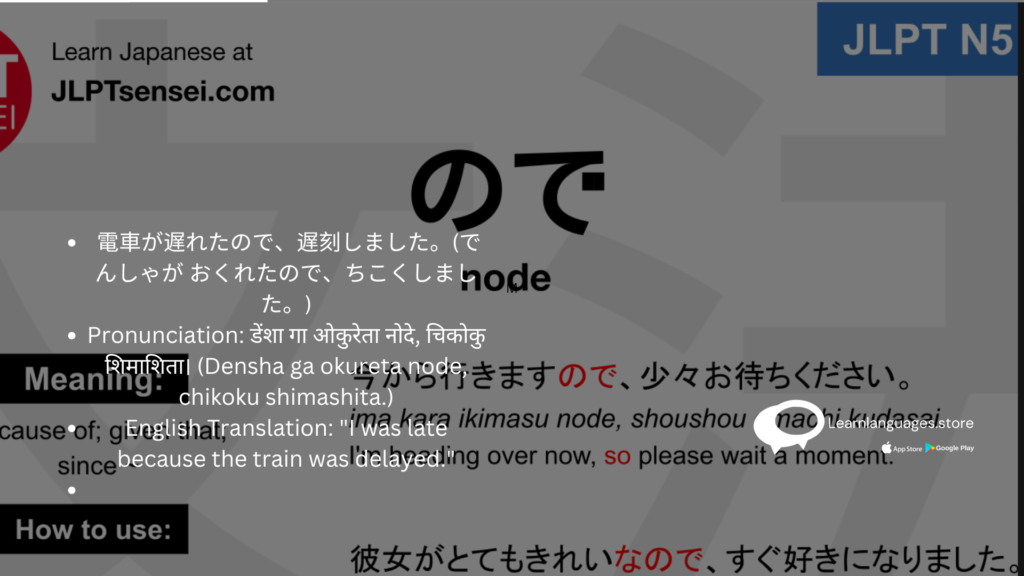Unlocking the Power of уАЬуБоуБз (node) in Japanese Grammar
Unlocking the Power of уАЬуБоуБз (node) in Japanese Grammar
Estimated reading time: 3 minutes
уБУуВУуБлуБбуБп (Konnichiwa)! Today, we’re diving deep into the world of Japanese grammar to explore the usage of уАЬуБоуБз (node). This versatile and essential conjunction helps you explain reasons or causes in your sentences. We’ll provide plenty of funny and engaging examples with English-Hindi translations to make learning fun and memorable. Let’s get started!

Understanding уАЬуБоуБз (node)
Sentence Structure
The structure for using уАЬуБоуБз (node) is straightforward. You attach уАЬуБоуБз (node) to the plain form of verbs, adjectives, and nouns to indicate the reason for something. Here’s a breakdown:
- Verb (plain form) + уБоуБз
- уБД-adjective (plain form) + уБоуБз
- уБк-adjective + уБк + уБоуБз
- Noun + уБк + уБоуБз
Examples with Contexts
- Reason for Being Late:
- Example: щЫ╗ш╗КуБМщБЕуВМуБЯуБоуБзуАБщБЕхИ╗уБЧуБ╛уБЧуБЯуАВ(уБзуВУуБЧуВГуБМ уБКуБПуВМуБЯуБоуБзуАБуБбуБУуБПуБЧуБ╛уБЧуБЯуАВ)
- Pronunciation: рдбреЗрдВрд╢рд╛ рдЧрд╛ рдУрдХреБрд░реЗрддрд╛ рдиреЛрджреЗ, рдЪрд┐рдХреЛрдХреБ рд╢рд┐рдорд╛рд╢рд┐рддрд╛ред (Densha ga okureta node, chikoku shimashita.)
- English Translation: “I was late because the train was delayed.”
- Humorous Twist: “рдЯреНрд░реЗрди рд▓реЗрдЯ рдереА, рдЗрд╕рд▓рд┐рдП рдореИрдВ рднреА рд▓реЗрдЯ рд╣реБрдЖред рдЪрд▓реЛ, рдмрд╣рд╛рдирд╛ рддреЛ рдЕрдЪреНрдЫрд╛ рд╣реИ!”
- Reason for Studying:
- Example: шйжщиУуБМуБВуВЛуБоуБзуАБхЛЙх╝╖уБЧуБ╛уБЩуАВ(уБЧуБСуВУуБМ уБВуВЛуБоуБзуАБуБ╣уВУуБНуВЗуБЖуБЧуБ╛уБЩуАВ)
- Pronunciation: рд╢рд┐рдХреЗрди рдЧрд╛ рдЕрд░реБ рдиреЛрджреЗ, рдмреЗрдВрдХреНрдпреЛ рд╢рд┐рдорд╛рд╕реБред (Shiken ga aru node, benkyou shimasu.)
- English Translation: “I study because I have an exam.”
- Humorous Twist: “рдкрд░реАрдХреНрд╖рд╛ рд╣реИ, рдЗрд╕рд▓рд┐рдП рдкрдврд╝рд╛рдИ рдХрд░ рд░рд╣рд╛ рд╣реВрдБред рд╡реИрд╕реЗ рдорди рддреЛ Netflix рджреЗрдЦрдиреЗ рдХрд╛ рд╣реИ!”
- Reason for Eating a Lot:
- Example: уБКшЕ╣уБМчй║уБДуБЯуБоуБзуАБуБЯуБПуБХуВУщгЯуБ╣уБ╛уБЧуБЯуАВ(уБКуБкуБЛуБМ уБЩуБДуБЯуБоуБзуАБуБЯуБПуБХуВУ уБЯуБ╣уБ╛уБЧуБЯуАВ)
- Pronunciation: рдУрдирд╛рдХрд╛ рдЧрд╛ рд╕реБрдЗрддрд╛ рдиреЛрджреЗ, рддрд╛рдХреНрд╕рд╛рди рддрд╛рдмреЗрдорд╛рд╢рд┐рддрд╛ред (Onaka ga suita node, takusan tabemashita.)
- English Translation: “I ate a lot because I was hungry.”
- Humorous Twist: “рднреВрдЦ рд▓рдЧреА рдереА, рдЗрд╕рд▓рд┐рдП рдмрд╣реБрдд рдЦрд╛ рд▓рд┐рдпрд╛ред рдбрд╛рдЗрдЯ рддреЛ рдХрд▓ рд╕реЗ рд╢реБрд░реВ рд╣реЛрдЧреА!”
- Reason for Happy Mood:
- Example: ф╗КцЧеуБпхдйц░ЧуБМуБДуБДуБоуБзуАБхмЙуБЧуБДуБзуБЩуАВ(уБНуВЗуБЖуБп уБжуВУуБНуБМ уБДуБДуБоуБзуАБуБЖуВМуБЧуБДуБзуБЩуАВ)
- Pronunciation: рдХреНрдпреЛрд╡рд╛ рддреЗрдирдХреА рдЧрд╛ рдИ рдиреЛрджреЗ, рдЙрд░реЗрд╢реА рджреЗрд╕реБред (Kyou wa tenki ga ii node, ureshii desu.)
- English Translation: “I am happy because the weather is nice today.”
- Humorous Twist: “рдЖрдЬ рдореМрд╕рдо рдЕрдЪреНрдЫрд╛ рд╣реИ, рдЗрд╕рд▓рд┐рдП рдЦреБрд╢ рд╣реВрдБред рдЪрд▓реЛ, рдкрд╛рд░реНрдХ рдореЗрдВ рдЪрд▓рддреЗ рд╣реИрдВ!”
Exceptions and Special Cases
While уАЬуБоуБз (node) is highly versatile, there are some nuances and exceptions to keep in mind:
- Politeness Level:
- In very formal contexts, уАЬуБоуБз (node) might be considered too casual. Instead, you might use уАЬуБЛуВЙ (kara) for formal writing or speech.
- Noun and уБк-Adjective Usage:
- When attaching уАЬуБоуБз (node) to a noun or a уБк-adjective, remember to include уБк (na). For example, уБНуВМуБДуБк уБоуБз (kirei na node) – “because it’s beautiful”.
- Negative Forms:
- When the verb is negative, you still use the plain negative form before adding уАЬуБоуБз (node). For example: шбМуБЛуБкуБДуБоуБз (ikanai node) – “because I don’t go”.
Identifying уАЬуБоуБз (node) in a Sentence
To spot уАЬуБоуБз (node) in a sentence, look for the pattern of a plain verb, adjective, or noun followed by уБоуБз (node), which will indicate the reason or cause for the main action or state.
Conclusion
In conclusion, уАЬуБоуБз (node) is an incredibly useful tool in Japanese grammar that allows you to explain reasons and causes clearly and naturally. Whether you’re talking about why you’re late, why you’re studying, or simply why you’re happy, this conjunction will make your sentences flow smoothly. So, practice using уАЬуБоуБз (node) with our humorous examples, and you’ll be expressing reasons like a native in no time!
-
Product on sale
 Japanese N3
Japanese N3₹42,600.00
₹62,600.00 -
Product on sale
 Japanese N4
Japanese N4₹24,300.00
₹32,600.00 -
Product on sale
 Japanese N5
Japanese N5₹18,300.00
₹24,300.00
Learn Languages Store
Vashi,
Email: services@learnlanguages.store










